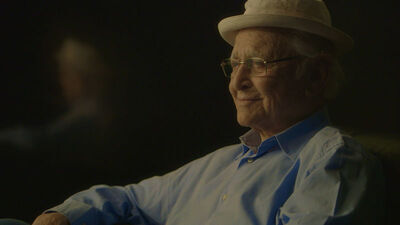CBS was so nervous about the first episode of “All in the Family,” it ran what today we might call a trigger warning, saying that the show “seeks to throw a humorous spotlight on our frailties, prejudices, and concerns. By making them a source of laughter, we hope to show—in a mature fashion—just how absurd they are.” In the context of comedy, “All in the Family” dealt forthrightly with extremely controversial topics including bigotry based on ethnicity, race, gender, sexual orientation, religion, and class. The Bunkers faced issues barely mentioned in homes or by politicians, much less on television: miscarriage, rape, abortion, cancer, menopause, and impotence. In an episode written by comedian Bill Dana, Archie, making extra money by driving a taxi, discovers that actor and nightclub performer Sammy Davis, Jr. has left his briefcase in the cab. Davis, playing himself, comes to the Bunker home to retrieve it. Archie may be bigoted, but he is also starstruck. He feels called upon to express his views about race in what he thinks is a friendly fashion, calling Davis a credit to his race, and asking, “You didn’t have a choice in being colored. But whatever made you turn Jew?” Archie goes on, “I think that if God had meant us to be together, he’d have put us together. But look what he done. He put you over in Africa, he put the rest of us in all the white countries.” Davis responds, “Well, you must have told him where we were, ’cause somebody came and got us.” Finally, Archie asks for a picture and just as his friend clicks the shutter, Davis gives Archie a big kiss on the cheek followed by one of the longest prolonged laughs in the history of television.
The Atlantic called it “The Show that Changed Television Forever.” “All in the Family” aired from 1971-79, with 55 Emmy nominations and 22 Awards. It was the first show to be number one in viewership for five years in a row and is always included in lists of the best, best-written, and most influential series of all time. It also generated hugely popular spin-offs, including “Maude,” an outspoken, politically left-leaning suburban woman introduced as Edith Bunker’s cousin. She had the first abortion on night-time series television, two months before the Supreme Court’s decision in Roe v. Wade. The series addressed pharmaceutical and alcohol abuse, marijuana, and the hypocrisy of “limousine liberals.” “Good Times,” set in a housing project, centered on a character introduced as Maude’s housekeeper, Florida (Esther Rolle). While it dealt with issues of prejudice, domestic abuse, and poverty, it was criticized for “minstrelsy” when the family’s teenage son, J.J. (Jimmie Walker) became an unexpected hit as a character who was exaggerated and silly.
Lear was visited by three members of the activist group, the Black Panthers, who complained that “Every time you see a Black man on the tube, he is dirt poor, wears shit clothes, can’t afford nothing,” Lear recalled in his memoir, Even This I Get to Experience. That led to “The Jeffersons,” a Black family introduced as the Bunkers’ next-door neighbors, who “moved on up” when their business became successful. The series song said they “finally got their piece of the pie” and the Jeffersons lived in a luxurious high-rise apartment. In the first episode, a Black woman who worked as a maid in the building and assumed that Mrs. Jefferson (Isabel Sanford) was one, too, says when she finds out that they own the apartment, “How come we overcame and nobody told me?” Like Archie, Mr. Jefferson (Sherman Hemsley) had strong opinions, often bigoted (he refuses to hire a woman as a manager, losing a qualified candidate to his competitor).

